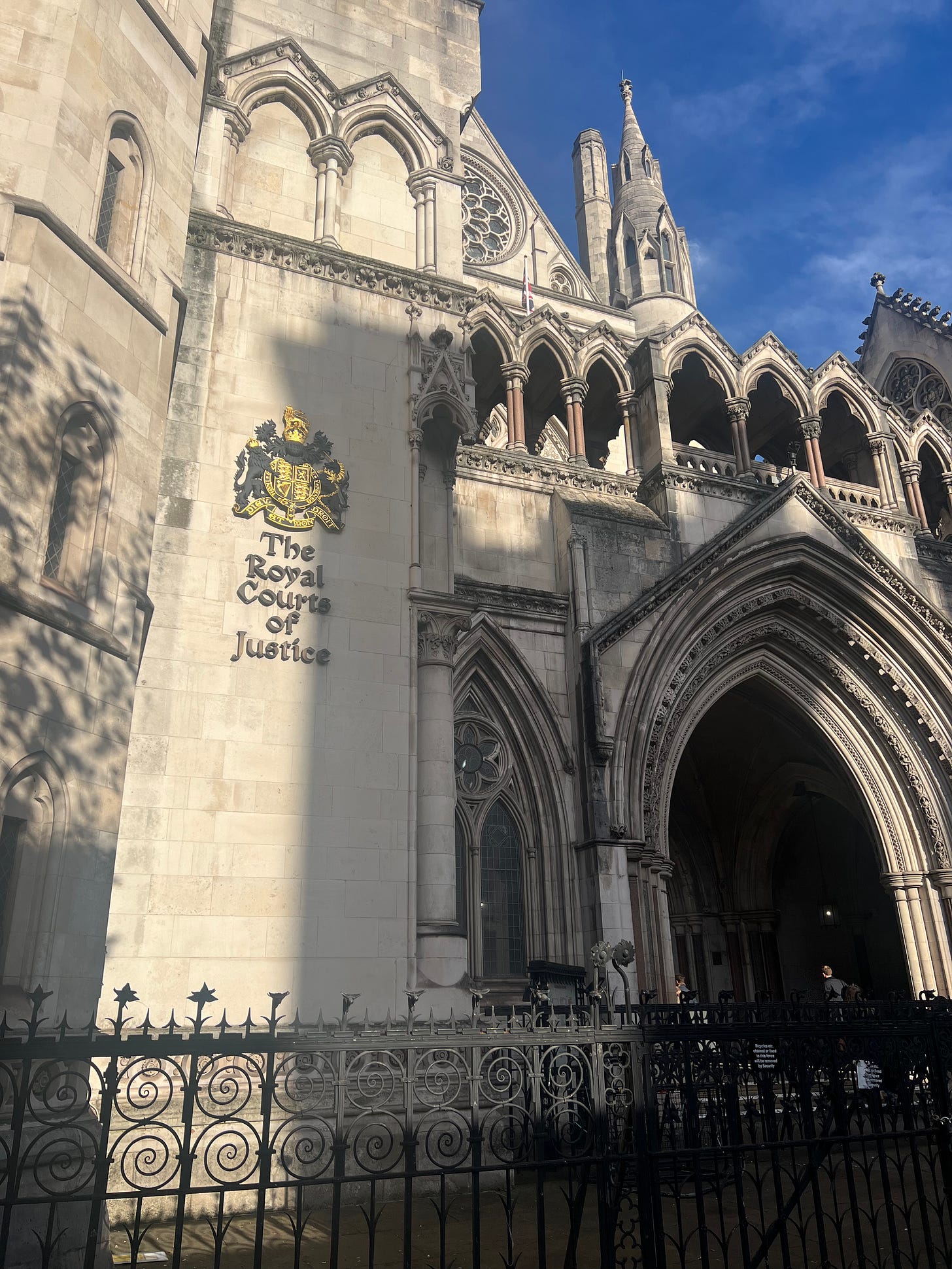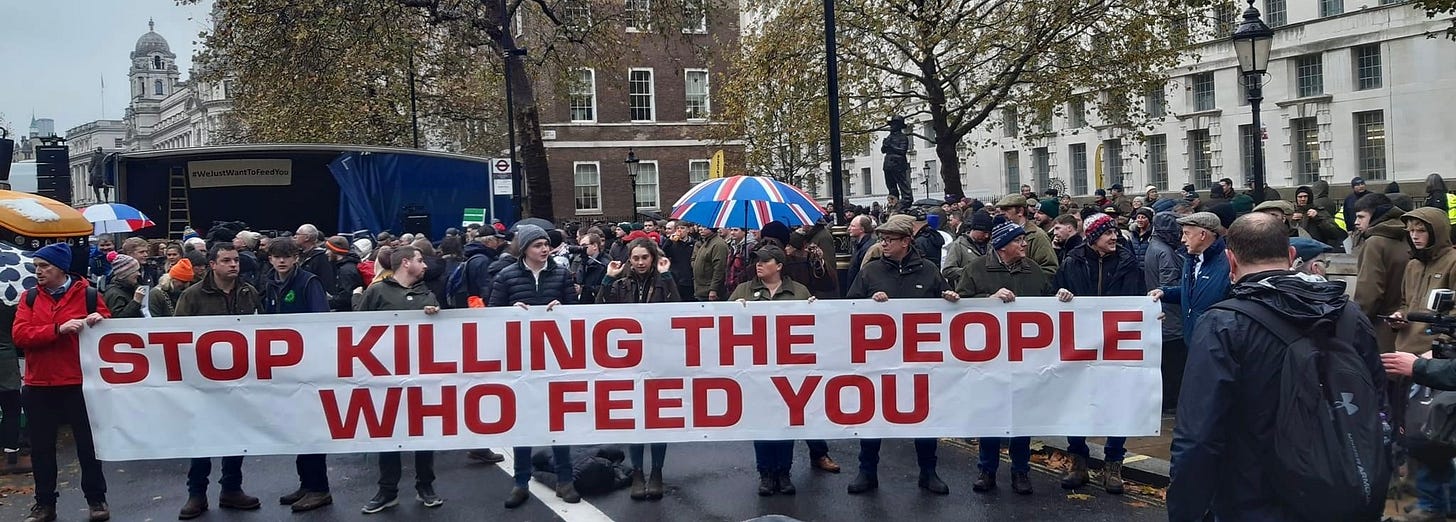I hadn’t planned to write about our struggles so soon after starting this Substack. Truthfully, it has taken me a long time to put this post together because every time I revisit it, my emotions shift—anger, heartbreak, determination, and hope all competing for control.
For two gruelling years, we fought to save our farm from the clutches of our local planning authority. Those years culminated in a week in the High Court, facing allegations of breaching an injunction order, followed by a draining planning inspectorate hearing to appeal a planning enforcement notice. This is the story of that battle—the fight to save our farm, our livelihood, and our home but it’s also a window into the systemic challenges farmers face across the UK
The Background
In 2022, we found ourselves in an impossible situation. Our rented accommodation came to an end, and as farmers with young children and working dogs, we struggled to find a property locally that would take us. At the same time, we had purchased agricultural land but hadn’t yet completed the necessary services to move our breeding herd onto it.
With homelessness looming, we made the difficult decision to spend our remaining savings on a twin static unit, moving it onto our land with plans to apply for retrospective planning permission for an agricultural worker’s dwelling. We were upfront and honest with the planning authority, inviting them to visit the site. During that visit, we were reassured that retrospective planning would be acceptable and were advised to wait for formal notice before submitting the application.
But just eight days later, we were blindsided by an injunction order preventing us from living in the lodge. The council applied for the injunction without any notice, giving us only a weekend to instruct a barrister and prepare for a hearing. The issue was that we had already moved into the lodge. Homelessness was once again a very real threat.
Despite our best efforts, the injunction was granted. The judge made no meaningful consideration of the fact that this decision would leave our nine-month-old baby without a home. Respecting the order, we moved into a local hotel, knowing it would drain our already-limited resources.
Two Years of Instability
Over the next two years, we moved repeatedly, each time losing more stability. First, we stayed at a property owned by Matt’s uncle, but it was on the market and only a short-term option. From there, we moved into Matt’s mother and stepfather’s spare room—an arrangement that ended when his stepfather needed major heart surgery. Finally, we bought a touring caravan and moved to another local farm, sharing the space with several other caravan residents.
None of these arrangements was ideal, but we made do. Every spare penny went into fighting enforcement notices issued against our farm. At one point, we returned to the High Court, requesting a variation of the injunction to allow us to live in the lodge while the planning appeal was underway. This was denied. The judge, unconcerned with the extraordinary circumstances, stated she didn’t want to set a precedent for others to follow.
Living in a touring caravan with a toddler while pregnant with our second child was one of the hardest periods of my life. Each move felt like starting over, and the strain of the council’s relentless actions was crushing. Every rejection, every court battle, and every missed opportunity to grow the farm weighed heavily on us. But we kept going, prioritising the welfare of our pigs and the quality of the pork we produced.
The Allegations
Despite adhering to the injunction order, our neighbours accused us of breaching it. In May 2024, the council brought committal proceedings against us based on "evidence" supplied by these neighbours. The claims were absurd—car movements, a Wi-Fi light, and a boiler running on a timer. Yet the council treated this flimsy evidence as gospel, escalating the matter to the High Court.
What shocked us most was the lengths to which the council and our neighbours went to build their case. Officers from Hart District Council fabricated a complaint in collaboration with a neighbouring council, East Hampshire, to justify entering the property where our touring caravan was sited. Enforcement officers then trespassed on the farm, entering our caravan without permission, taking photos, and leaving without informing us. If it weren’t for the landlord’s farmhand catching them in the act, we might never have known.
This blatant overreach was not just unethical but illegal. Yet, under UK law, evidence obtained unlawfully can still be admitted in court. The council’s conduct throughout this ordeal displayed a shocking abuse of power, driven by what can only be described as a vendetta.
The High Court Hearing
By November, we were back at the Royal Courts of Justice. For four long days, we listened as our neighbours exaggerated their claims, presenting themselves as victims of a non-existent conspiracy. Statements were peppered with melodramatic outbursts, including one neighbour theatrically claiming, “They’re there! I know they’re there!”
When it was our turn to take the stand, Matt and I stood firm. We spoke with conviction about our passion for farming and the commitment we have to high-welfare practices. But it wasn’t enough.
The judge ruled that for a small portion of the time alleged, we had breached the injunction. His reasoning? That as a new mother, "common sense" dictated I would have chosen the lodge over the touring caravan. No thought was given to the reality of our situation—living in freezing winter conditions, without running water or a flushing toilet, while caring for a newborn and a toddler.
The ruling came with a six-week custodial sentence, suspended for 12 months, and the council’s £110,000 legal costs to be reviewed by a taxing master. The financial burden alone threatens to cripple our farm.
The Bigger Picture: Systemic Corruption
Our story is not unique. Across the UK, small-scale farmers are fighting battles against a system that seems determined to undermine them at every turn. Planning authorities hold immense power, often wielding it arbitrarily or in favour of larger, industrial interests. The same councils that scrutinise and obstruct smallholders like us are the ones approving sprawling housing estates and commercial developments with barely a second glance.
Hart District Council’s behaviour throughout this ordeal exemplifies the corruption and lack of accountability within the system. From fabricating complaints to trespassing and colluding with other councils, their actions were not about enforcing planning regulations—they were about punishing us for daring to challenge them.
This case also highlights the broader struggles facing British farming. The government’s failure to protect farmers from substandard imports, coupled with the increasing financial burden of taxation and regulation, is driving more and more small farms out of business. At the same time, the public is fed misleading narratives about food production, obscuring the real cost of cheap, factory-farmed meat.
If small farms like ours cannot survive, what hope is there for sustainable farming in the UK? How can we ensure food security, ethical practices, and environmental stewardship when the very institutions that should support these values actively work against them?
A Call to Action
Looking back, I wish we hadn’t remained silent. Fear of upsetting the judge stopped us from rallying our community, but silence doesn’t serve those already fighting to survive. We must speak out—not just for ourselves but for all the small-scale farmers facing similar battles.
If this experience has taught us anything, it’s that resilience is built through hardship. No matter how tough things get, it’s the belief in what you’re doing—and the people you’re doing it for—that keeps you moving forward.
We don’t know what the future holds, but we won’t give up. We’ll keep raising our pigs, producing exceptional pork, and fighting for the values that brought us here. This isn’t just about our farm. It’s about fighting for a system that supports sustainable, ethical farming—because without it, we all stand to lose.








It will work out. Forever the optimist. In the 70's I bought 7 acres and 100 sows. Lived in a 12' x18' shack long enough for council to allow a caravan. Then in the 80's brought up two babies in an old caravan, 13 years with no drainage or running water or heating . Tough. Now have 40 acres with 3 farm cottages for the children, and my cows. Fortunate to have a good wife. There is hope, good luck to those brave souls starting out on the journey today, it's well worth the struggle.
Keep fighting Helen and family. We’re fighting the same battles here in America. Thank you and God bless 🙏